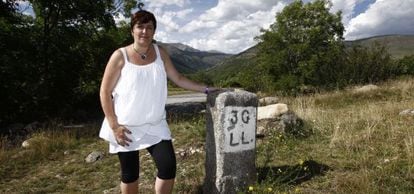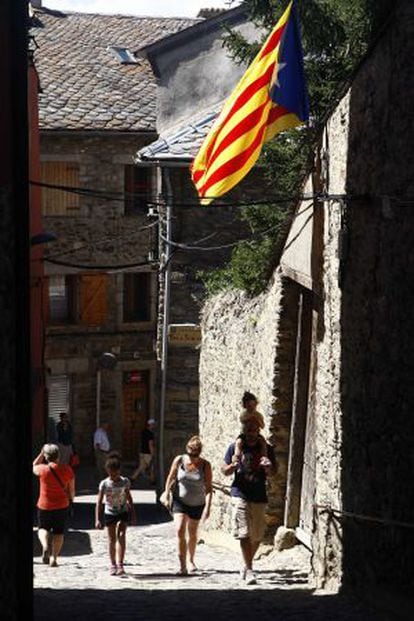The Spanish town that ended up in France
Llivia was ceded to the French in 1659, but a bureaucratic oversight kept it officially in Spain

For the last 354 years Llivia has been separated from its homeland, a small piece of Spain some five kilometers within French territory, deep in the Pyrenees.
A French hiker, complete with mountain boots, backpack and sunglasses, stands in the shade of the hefty stone walls of the 16th-century church, talking on his cellphone. “I’m in Llivia. No, no, in Spain,” he says, although the truth of the matter is that it’s hard to know quite where Llivia is: as you enter the village from the French side, there is no indication that you are entering a Spanish town.
Catalan flags predominate here, suggesting most people support independence from Madrid
Arriving from the Spanish side, after passing a European Union sign by the side of the road with “France” written inside the 12 gold stars of the bloc’s blue flag, there is no clue as to Llivia’s Spanish origins – in fact, for many of the town’s inhabitants, it isn’t part of Spain. Catalan flags predominate, suggesting most people living here support independence from Madrid.
Llivia rises up before the visitor with a certain cinematic suspense. One heads through a tunnel (there are plenty of them there), and then suddenly, as you emerge into the light, you’re in another place. Each exit from each tunnel brings you into a magical landscape. Behind is the C-16 road down to Barcelona, which is about two hours away. The mountains engulf the visitor, their size and greenness dizzying. At this point the landscape settles into meadowland, dotted with farms and stone wooden-beamed houses. It takes a while to make the 1,300-meters-above-sea-level journey, but it is worth the effort.

Llivia, around 175 kilometers from the capital of the province it belongs to, Girona, came to find itself in French territory following the 1659 Treaty of the Pyrenees, which brought an end to the two countries’ bitter fighting during the Thirty Years War. The so-called Peace of the Pyrenees recognized Spain’s defeat, for which Phillip IV ceded 33 villages from the Querol Valley to France, among which should have been Llivia. But due to a technicality, the territory remained Spanish, having been named a villa and not a village 130 years earlier by Charles I.
Since then, Llivia’s 1,700 or so inhabitants have found themselves occupying a small Spanish island amid the vast sea of France, and all that entails. Mayor Silvia Orriols says that relations with neighboring villages and towns are “excellent”, but that dealing with the bureaucracy of the state from within another can be challenging. While its neighbors sort out simple issues such as water supply and road maintenance between themselves, Llivia must refer such matters to the Catalan regional government, or on occasion Madrid, which can lead to delays... 40-year-delays.
This is how long the community has been waiting for an agreement to settle the water disputes that erupt periodically when supplies dry up. Llivia has two sources for its water, both of which are problematic. “The French get the water before us, they send it up the hill, or they just cut it off,” says Oriols. The agreement that would allow the town to connect to a third source, which is already installed, is ready to be signed: “That was in 1973,” sighs Orriols.
Llivia found itself in French territory following the 1659 Treaty of the Pyrenees
This continuation of the French-Spanish war led to another battle, that of stop signs. Llivia is linked to the nearest town in Spain, Puigcerdá, by the N-154, but back in the 1980s, the French put up a stop sign at the edge of the town.
Llivia’s town hall argues that this contravenes the Treaty of Bayona, which gives the Spanish community “right of way”, and has appealed against it to Paris. When the French authorities didn’t bother to reply, the sign was taken down one night. It was replaced, and then taken down again, until the Gendarmerie decided to man the stop sign. Over the last 20 years there has been a stop sign, a pedestrian crossing, plans for a crossroads and a roundabout, and now a bridge, none of which is to Llivia’s satisfaction. “Madrid takes no notice of us,” says the mayor: “It may seem a trivial matter, but for us it is just another example of how the French always seem to get their own way.”
The community has been waiting 40 years for an agreement to settle regular water disputes
But all in all, the good people of Llivia say they have few complaints. “It was different when Franco was alive,” says Antonio Gil, born and bred in Llivia. He says that until the early 1980s, residents were required to carry a special pass to enter and leave the town. “But there were also advantages, there were francs and pesetas, and a lot of French people came to buy because things were cheaper, and they still are, and we would then take the francs to Andorroa, about 70 kilometers away, to change them.”
Each May, the town holds a three-day event when the Spanish Civil Guard, the town hall, and the Gendarmerie check each of the boundary stones. “We check that neither country has sneaked back a few meters,” jokes Orriol. Each stone has LL (Llivia) on one side, and on the other the initials of the corresponding French council.
The only other lingering dispute is over pastureland in an area known as the Bullossas, where local farmers have taken their cattle for centuries. “The French declared the area around it a natural park, including our bit, and they wouldn’t let us in,” says Orriols, looking out to the surrounding mountains. “They don’t seem to realize that landscapes don’t understand borders.”











































